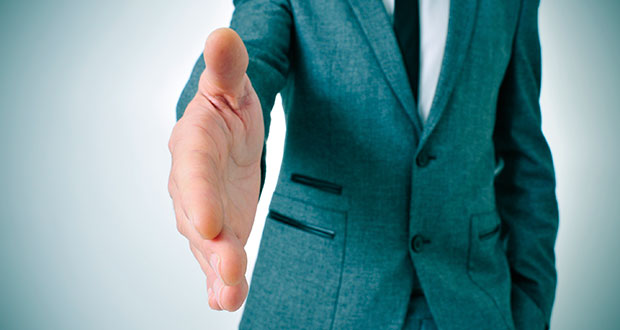Why it’s time to bring etiquette back to legal proceedings
By: JESSICA STEPHEN//June 3, 2014//

They ought to be common sense — those pleasantries and courtesies that make interactions with clients and colleagues so much more civil and productive.
But etiquette, it seems, is not always a matter of instinct. Or, these days, even interest.
“There’s less concern about being congenial with the other side,” said Dean Dietrich, a shareholder and employment and labor relations attorney with Ruder Ware LLSC in Wausau, who also serves as vice chair of the State Bar’s committee on professional ethics.
For some, handshakes and saying thanks might seem silly, or even counter-intuitive, in the adversarial system of law. But, Kendra Brodin, who counsels lawyers nationwide on professional development, said attorneys would be short-sighted to dismiss such soft skills.
“I think we forget we need to build a relationship first before making any sort of request or demand. We forget the other person is, indeed, a person,” said Brodin, director of career and professional development at the University of St. Thomas School of Law in Minneapolis.
And while rudeness doesn’t run rampant, Dean said the pace of professional life and a growing attachment to technology have slowly eroded interpersonal skills, which he and others argue lay the foundation for the relationships so key to practicing law.
“Politeness is key,” Brodin said. “Sometimes we feel the pleasantries are outdated, but it really goes back to interpersonal skills; recognizing how your words and actions have an impact on someone.”
So, next time you’re rushing into court, cast a glance behind you and hold the door.
“It just requires a little thought in advance, but it goes a long way,” said Douglas Frazer, a shareholder at DeWitt Ross & Stevens SC.
Brodin agreed.
“We develop these habits by starting small: holding a door, saying please and thank you,” she said. “But, then, you do it regularly and you become known as someone who has those interpersonal skills. It could translate for a jury. It could translate into business; you never know what that will do who might send you a referral.”
Here are a few other things to keep in mind:
Back to basics
“Some of this, hopefully, goes without saying, but we’ll say it just in case,” Brodin said.
- Make eye contact. Don’t stare, but make a strong eye-to-eye connection to convey warmth and interest.
- Shake hands. A firm (not bone-crushing) grip is always good. And, if your hands get cold easily, consider a warm drink before making the rounds.
- Whenever possible, answer a voicemail or email within 24 hours. Even if you don’t have time to offer a full response, Frazer suggests a quick note. “At least have your assistant respond acknowledging that you got their call or email, and you will respond on Tuesday — some kind of acknowledgement that you haven’t dropped the ball.”
When in doubt, go old school
Think handing out business cards is too dated to be effective? Think again.
“I am a fan of business cards,” Brodin said. “They’re a tangible representation of you.”
Business cards also are something the recipient can hang on to and use to follow-up.
“We often say we’ll text or email or look someone up on LinkedIn, but that is a lot of information and, too often, we forget,” Brodin said.
Want to take that a step further? Instead of following up with an email, send a note.
“It’s another old school technique, but I keep a pile of stationery on my desk and I send a personal note,” she said. “It doesn’t take that much longer than connecting with someone online, and it’s so rare nowadays that it does stand out.”
Keep it simple
Frazer recommended attorneys think more about how they communicate. If you’re inclined to pick up the phone, consider meeting face-to-face or even trying Skype. If you tend to email instead, pick up the phone.
“It can actually be much more efficient and cost-effective to meet,” he said, “than to exchange messages or emails. And just about everybody would prefer to get a phone call, good or bad news.”
If you’re filing a lawsuit or a motion, think about giving the other side a heads-up.
Legal News
- Former law enforcement praise state’s response brief in Steven Avery case
- Eric Toney announces re-election bid for Fond du Lac County District Attorney
- Former Wisconsin Democratic Rep. Peter Barca announces new bid for Congress
- Republicans file lawsuit challenging Evers’s partial vetoes to literacy bill
- More human remains believed those of missing woman wash up on Milwaukee Co. beach
- Vice President Harris returning to Wisconsin for third visit this year
- Wisconsin joins Feds, dozens of states to hold airlines accountable for bad behavior
- Trump ahead of Biden in new Marquette poll
- Bankruptcy court approves Milwaukee Marriott Downtown ‘business as usual’ motion
- New Crime Gun Intelligence Center to launch in Chicago
- Arrest warrant proposed for Minocqua Brewing owner who filed Lawsuit against Town of Minocqua
- Wisconsin Supreme Court justices question how much power Legislature should have
WLJ People
- Power 30 Personal Injury Attorneys – Russell Nicolet
- Power 30 Personal Injury Attorneys – Benjamin Nicolet
- Power 30 Personal Injury Attorneys – Dustin T. Woehl
- Power 30 Personal Injury Attorneys – Katherine Metzger
- Power 30 Personal Injury Attorneys – Joseph Ryan
- Power 30 Personal Injury Attorneys – James M. Ryan
- Power 30 Personal Injury Attorneys – Dana Wachs
- Power 30 Personal Injury Attorneys – Mark L. Thomsen
- Power 30 Personal Injury Attorneys – Matthew Lein
- Power 30 Personal Injury Attorneys – Jeffrey A. Pitman
- Power 30 Personal Injury Attorneys – William Pemberton
- Power 30 Personal Injury Attorneys – Howard S. Sicula











